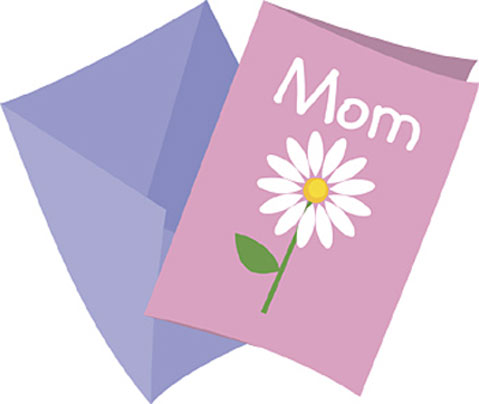Paper Dolls
Separating Mom from Myth in the Greeting Card Universe

When it comes to Mother’s Day gifts, I topped myself when I was about nine years old. That’s the year I gave my mom an apron the color of a Caltrans truck that read, in one of those curvy typefaces so popular in the ’70s: Fuck Housework. She still treasures it.
Luckily for me, Mom is perfectly content these days receiving a card for Mother’s Day, assuring me that I always find the best ones. But it gets harder every year.
Growing up, I got used to the idea that my mom was simply not like other kids’ moms, with her unshaven legs and her grounds maintenance job. After I moved to California as an adult, I became convinced that, had we lived here instead of in Florida during my childhood, a mom like mine-who sprouted her own bean sprouts and refused to own a television-would not have stood out at all.
But lately, perusing the racks of Mother’s Day cards, I can’t help but wonder: Are there really no other moms like mine, who’d rather curl up with a good book than a stiff drink, who’d rather emulate Bob Vila than Martha Stewart, whose forays into the culinary arts resulted in banana bread that resembled a hockey puck?
I can understand the hyperbole that abounds in these little multicolored missives-the almost universal descriptions of moms as supportive, glamorous, admirable. Even on a holiday as invented and commodified as Mother’s Day, it would be poor form to bring up the times your mom discouraged you from dreaming big, mortified you in front of your friends with her fashion choices, or got in a petty fight with your aunt.
I’m not even asking for cards that reflect the complexity and ambivalence of people’s relationships with their mothers. How could a mere card express your gratitude to her for introducing you to her passions, whether for dance or archaeology; your resentment at her attempts to draw you in to her melodramas; your compassion for the hardships she suffered; your absolute conviction that she will never understand you; your guilt for loving but not liking her; or-especially as age starts collecting its inevitable debts-your grief at seeing her begin to fail and your frustration with her utter refusal to admit it? No card could do that.
But couldn’t they at least acknowledge the individuality of mothers? Instead, Mother’s Day cards attempt to reduce the Birkenstock-wearing mom, the professionally successful mom, the triathlete mom, even-dare we mention her-the recovering alcoholic mom to the same two dimensions, so she can be slipped neatly into a pink envelope.
According to this paradigm-as restrictive as a whalebone corset and about as relevant-motherhood means a floral motif, preferably ornamented with ribbons, sequins, or crystals. The greeting card mom’s idea of a relaxing day apparently consists of shopping for high-end accessories or visiting a spa-and she needs the break, because all she does is clean up after everybody else (and bake).
More than three decades out of elementary school, with a woman-a mother-running hard for president, I’m still trying to find space for my mom in our culture’s motherhood mythology. A native New Yorker, she’s apt to find dandelions just as pretty as daffodils. She shops in thrift stores for the pants and sneakers she always wears. She presents anything she cooks with the warning, “I don’t know if this is any good.”
She taught me to read when I was four and to do my own laundry when I was 11. Because of her, I love literature and languages and became a self-sufficient adult. She tried hard not to pass her neuroses down to me, so I’m not afraid to fly or speak in public. Sure, she drove me nuts sometimes, but I always knew how much she loved me, and she was wise enough to let me be the person I would become.
I finally found a card. No flowers or bows, just a whimsical drawing of a jeans-wearing mom on the cover and a simple sentiment inside. So help me, it came with a pink envelope.



